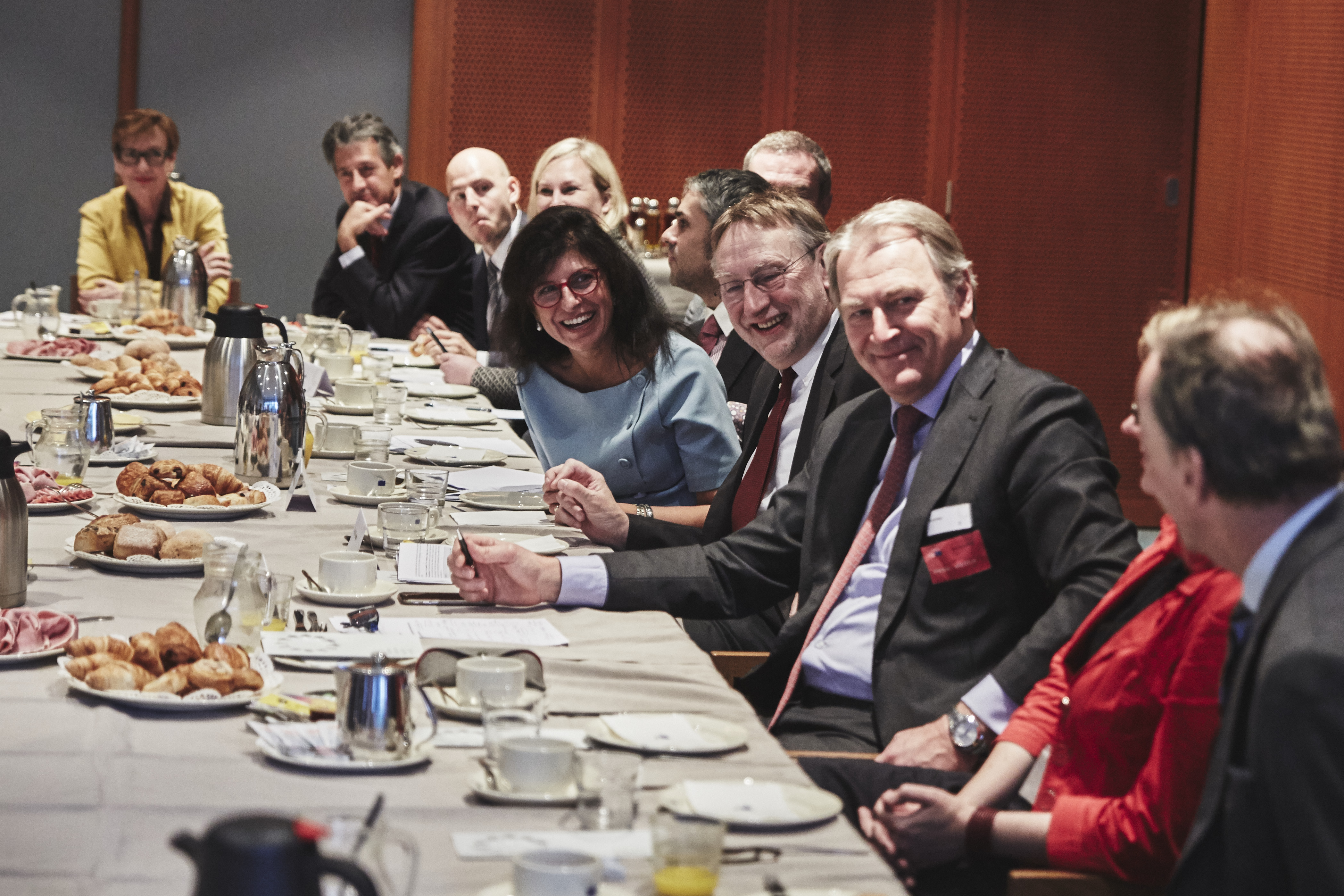
The European Exhbition Industry Alliance organises events in Brussels to exchange with the European Insitutions and discuss current issues, needs and policy proposals.
“How trade fairs and exhibitions contribute to SME internationalisation”
European Parliament Breakfast hosted by Bernd Lange MEP, Chairman of the Committee on International Trade
On 21 October 2015, the European Exhibition Industry Alliance held a Breakfast Meeting in the European Parliament, hosted by Bernd Lange MEP, Chairman of the Committee on International Trade. European companies need to internationalise in order to access new markets and to grow. Multiple EU policies and support initiatives pursue this aim. Before the background of the ongoing TTIP negotiations, the recent publication of the new trade strategy by the European Commission and the assumption that 90 % of growth will come from outside of the EU in the future, the discussion focused on the practical implementation of trade and commerce.
Gerald Böse, Chairman of the European Chapter of UFI and CEO of Koelnmesse (Germany) and María Martínez, EMECA President and Member of the Management Committee of IFEMA (Spain) presented key findings about how trade fairs stimulate innovation and connect businesses with customers and cooperation partners globally – in Europe and in the target regions worldwide. “European exhibitions represent roughly half of the world market and 90 % of the world leading trade fairs in their respective sector take place in Europe. So, for SMEs, internationalisation can start at home, on their doorstep” explained Gerald Böse. Eurostat figures show that there is still an enormous potential of SMEs in the EU that are no usual exporters yet. This enormous potential can be activated and addressed with tailored measures.
María Martínez highlighted the community aspect of exhibitions: “They are democratic instruments that give the same visibility and chances to small or big companies in one sector. And trade is peoples’ business”. Digital offers complement the trade fairs today facilitating access to companies and products all year round. She outlined several measures that serve as incentives and increase chances for companies, such as partner country concepts, group pavilions, B2B matching supported by digital services, paired with international buyers programmes, sector intelligence, training, competitions and awards for innovations or start-ups, that bridge the gap between invention and the market.
Rafael Hierro, Director of Unimasa, a Spanish company of home and decoration products, illustrated how his company seized the market chances to grow and diversify. He explained that in order to enter into a new market, attending the national trade fair is the best solution while thorough preparation as to the specific market conditions is key. He sources and sells via trade fairs in Spain, Italy, France, Germany to 18 European countries. It is the occasion of the year to meet with suppliers and get direct feedback from shop owners, who are close to the end consumers. “We collect 25% of our sales in trade fairs and 37% of our new clients come from fairs. Exhibitions are very intense and accelerate business. They trigger a lot of strategic thinking”, he added. In his opinion, the costs of European fairs are fair and reasonable in relation to the high quality of services and business opportunities they deliver, also compared to new digital sales platforms.
During the discussion, Members of the European Parliament pointed to the need to create new measures to help SMEs to participate in trade fairs and to facilitate access to finance. In return, the Commission representatives outlined their plans for some new programmes in the framework of COSME and the Enterprise Europe Network. Barbara Weizsäcker, Secretary General of EEIA, invited the Commission to include the instrument “exhibitions” into the existing and new support measures. Furthermore, she explained that early coordination between the different players like national export promotion programmes, EU-projects, other sponsored initiatives or measures offered by the exhibition organisers themselves, is crucial to avoid parallel structures, to seize synergies and maximise effects to the benefit of SMEs.
Bernd Lange commented that in his experience, trade fairs have a positive effect on networking on two levels: they not only enable finding new international contacts but even connect local players that had not had the chance to find each other before. In this context, it was highlighted that exhibitions trigger significant social-economic effects in the city and region where they take place, thus creating growth and securing jobs on the level of hotels, restaurants and catering, transport, logistics, stand construction and many more.
“All EU representatives share the same interest to boost SME internationalisation and we understand that trade fairs are very effective tool. It makes sense for SMEs or start-ups to concentrate on participating in exhibitions taking place in Europe as a first step to internationalise. We should put more effort on making our support programmes simple and accessible to the SMEs and to better coordinate initiatives on all levels together with the exhibition organisers,” Bernd Lange concluded.
Background Information
The European Exhibition Industry Alliance represents over 400 exhibition organisers and venue operators in Europe. These are organised in UFI, the Global Association of the Exhibition Industry and the European Major Exhibition Centres Association EMECA.
For more information please visit www.exhibition-alliance.eu www.ufi.org www.emeca.eu
Go to media release